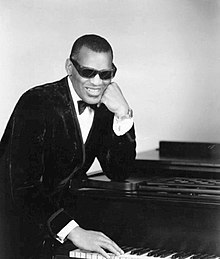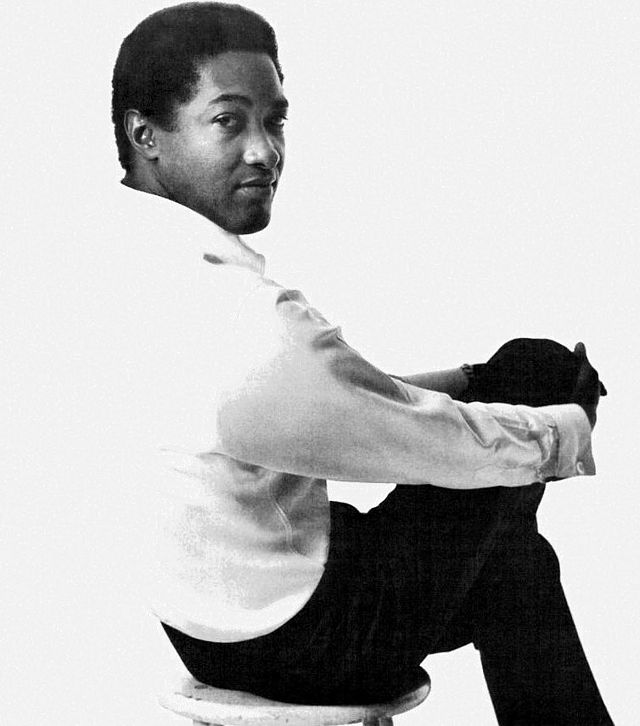
Pioneering Performers and General Characteristics (Continued)
Ray Charles's career both predates and post-dates soul music. Heavily influenced by the Nat King Cole Trio, Charles's first recordings in the late 1940s and early 1950s for Down Beat and Swing Time Records were rooted in the mellow club blues tradition pioneered by Cole, Cecil Gant, and Charles Brown. In 1952 Charles signed with Atlantic Records. His career grew significantly as he gradually incorporated elements of gospel music into both his vocal performance and the arrangements he crafted for an expanded horn-laden ensemble.
This live performance of "I Got a Woman" in 1958 at the Newport Jazz Festival features many gospel-influenced characteristics, including a) the recitative, or no tempo, singing style, and melisma, natural and full-throated sound productions beginning to 00:42 b) call-and-response (vocal call and a one-bar response by brass and woodwind instruments that begins at 00:42 and continues to 01:43 c) an extended 3 minute and 15 seconds vamp section that begins at 02:47 and continues to 06:04.

Ray Charles in the 1960s
Charles also began taking gospel tunes, many of which he had been singing since three, and rewriting them as secular tunes. Praises to the love of God became tributes to the love of a woman. "This Little Girl of Mine" (1955), "I Got a Woman" (1955), and "Lonely Avenue" (1956) are all based on religious models. Throughout the second half of the 1950s, Charles used this successful formula to write and record a succession of hits that helped provide the blueprint for what became soul music, each featuring an emotion-laden, gospel-inflected lead vocal, gospel chord changes, and heavy use of call-and-response. In the early 1960s, Charles went on to cut a series of ground-breaking country soul recordings.
Similarly, Sam Cooke first sang gospel music professionally while he was still a teenager with the Chicago-based Highway QCs. In 1950 he replaced R.H. Harris as lead singer in one of the most important post-war gospel quartets, The Soul Stirrers. Even though The Soul Stirrers' home base remained in Chicago, the group recorded for Specialty Records in Los Angeles during Cooke's tenure. Cooke sang lead on emotionally charged recordings such as "Were You There" , "Touch the Hem of His Garment" , "Be With Me Jesus" , and "Nearer to Thee" (the latter three written by Cooke). At Specialty, producer Robert Alexander "Bumps" Blackwell suggested that Cooke also record solo as a secular artist.
Because of the lack of support from Specialty owner Art Rupe, Blackwell took Cooke to the smaller Keen label where the former gospel singer wrote and recorded a succession of pop singles including "You Send Me" (1957), "Everybody Likes to Cha Cha Cha" (1959), and "Wonderful World" (1960). Cooke's moving to the Keen label is important to the development of soul music because this label allowed him the freedom to combine his gospel roots with rhythm and blues. Here is Cooke on the Ed Sullivan Show in 1957 performing one of his signature songs "You Send Me."

Sam Cooke "You Send Me" on The Ed Sullivan Show [ 00:00-00:00 ]
Due to Cooke's success with a number of pop singles, by 1960 he signed with RCA Records due to its many resources domestically and internationally. Now with RCA, he continued to write and record an ever more impressive string of soul and pop hits, including "Chain Gang" (1960), "Cupid" (1961), "Twistin' the Night Away" , "Bring It On Home to Me" , "Having a Party" (all 1962), "Another Saturday Night" (1963), "Shake" , and "A Change is Gonna Come" (both 1964). Cooke's legacy is immense, influencing a who's who of subsequent soul singers, most notably Otis Redding, Bobby Womack, Johnnie Taylor, and Al Green.
A Change is Gonna Come
I was born by the river
In a little tent
Oh, and just like the river, I've been runnin'
Ever since
It's been a long
A long time comin', but I know
A change gon' come
Oh, yes it will
Long Walk to D.C.
It's a long walk to DC but I've got my walking shoes on
I can't take a plane, passer train, because my money ain't that long
America we believe, oh that you love us still
So people I'm gonna be under to wipe away my tears






